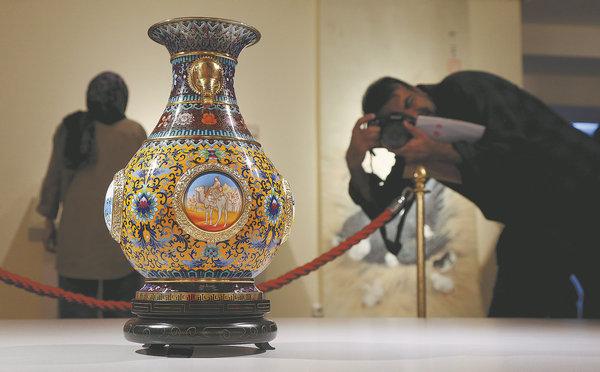
A visitor takes a photo of an item at the exhibition, Endless Clouds of Silk Road, at the Malek National Library and Museum in Teheran, Iran, on Oct 12.
The memory and inspiration of the Silk Road, a series of ancient trade routes stretching from China to Europe, provide an attractive platform for cultural exchange between countries once connected by them.
In one of the halls at the Malek National Library and Museum in the Iranian capital Teheran, vivid paintings were among a series of works of art that caught the attention of visitors, both Chinese and Iranian.
Open to the public since Oct 12 and running until Nov 10, and taking the Silk Road as its theme, the exhibition, Endless Clouds of Silk Road, features a selection of Chinese art, manuscripts by renowned Chinese authors, and ancient coins used to trade along the routes, and celebrates the cultural exchange between China and Iran.
"The exhibition is very interesting as it features the fusion of Chinese and Iranian cultures and their impact on each other," says one visitor, Shaqayeq Evaz-Zadeh.
"The Iranian and Chinese people have had very good relations for a very long time, and share many cultural similarities," continues Evaz-Zadeh, who is a film and theater director.
She mentions that there are many commonalities between Iranian and Chinese poetry and traditions, indicating time-honored, people-to-people and cultural exchanges between the two countries.
The works on display demonstrate the trade relations between the two countries along the Silk Road, which helped bring both peoples closer, she adds. "Visiting the exhibition gave me a very good feeling, as I was able to see the closeness between the two cultures again."
Evaz-Zadeh also says she felt the amicable atmosphere at the exhibition, and saw Iranian and Chinese visitors chatting happily with one another.
"Throughout history, Iran and China and their people have always had transactions, interactions and relations with each other," says Masoud Nikqalb, another visitor, adding that the work on display makes a feature of traditional styles and simplicity. " (This) is very interesting and makes them more tangible to visitors."
Nikqalb, a cinema and theater actor, says people from both countries share cultural commonalities, particularly valuing the family and respecting the elderly. "The art displayed at this exhibition gave me a sense of cultural proximity, as they conveyed concepts shared between the two peoples."
Jebrael Nokandeh, director of Iran's National Library and Museum, says the exhibition shows great potential for cooperation between the two countries' museums, voicing confidence that the event would help increase mutual understanding.
He speaks highly of Chinese museums for their "very high" standards and "cooperation with counterparts across the world", including the National Museum of Iran.
Nokandeh says that Iran organized an exhibition, The Glory of the Ancient Persia, at Beijing's Palace Museum in January, and also at the Shanghai Museum in June.
He called for expanding the "very good" cultural cooperation between Iran and China to further strengthen the bond between their peoples.




